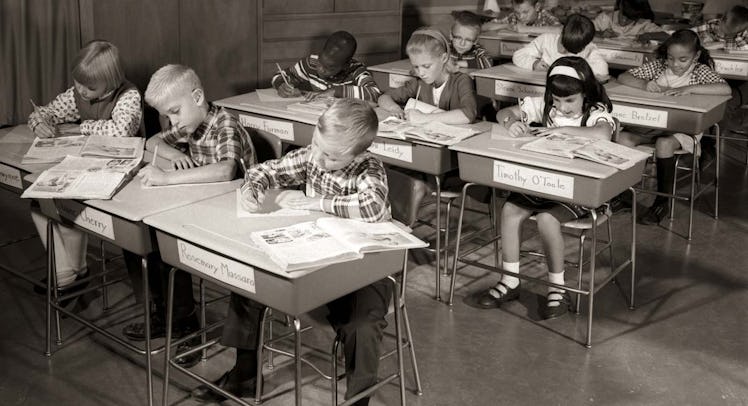5 Education Myths All Parents Should Know
Public schools don't always beat private, little kids should be homework free, and Waldorf is a gamble.

Education is a messy subject: a mishmash of old traditions and untested new ideas, all of which supposedly have children at their core. It doesn’t help that along with the kids and parents there is a vast cabal of bureaucratic stakeholders from teachers to lawmakers who all have ideas about the educational ideal. This makes the educational environment ripe for hucksters and well-meaning mavericks alike, all of whom can be prone to peddling misinformation that complicates parent’s ability to make informed choices about their kids’ education.
In order to make things just slightly easier, here are five myths that, when removed from parental consideration, might lead to a bit of clarity. At least until the kid is ready for college, at which point a parent can tap out and let the kid do the research for once.
Kids Need Preschool
There’s a perception among many parents that preschool is necessary in order for children to be prepared for Kindergarten. Sadly, for most kids, the research does not support this idea. There is nothing a child learns at preschool that they would not otherwise learn with a parent at home. The preschool ages are meant to develop socialization and play skills. Getting an implicit jump on ABCs and counting may be nice, but it is isn’t required for jumping into a public school education.
But notice that “most kids” qualifier. The children who do benefit from preschool are those who come from disadvantaged homes where they may hear fewer words, receive less nutritious food, or be exposed to less prosocial behavior. In those cases, a few hours of preschool a day can close important gaps.
Basically, the odd logic works out like this: If you can afford to get your kid into a highly competitive and expensive preschool program, your kid probably doesn’t actually need preschool.
Kids Need Homework
More homework does not always equal more learning. In fact, the homework research out there in the world is pretty divided. Homework appears like it might be a bit beneficial for older students, but for younger students, there is very little to correlate homework with achievement. In fact, it can serve to make kids school averse.
So it’s okay for parents to feel a bit frustrated with that Kindergarten homework that’s being sent home. The time spent forcing a kid to concentrate on poorly copied worksheets would probably be better spent looking for bugs outside.
Teachers Should Cater to Kid’s Learning Styles
The idea that kids can be visual or auditory learners and that teachers should cater to the way certain kids take in information has been roundly debunked a neurological myth, or a neuromyth, as it were. It’s simply not true that catering to a certain learning style will increase achievement. In fact, it can calcify certain learning habits in children that hinder them from taking other problem-solving approaches in the future.
Parents can help this myth finally die a dignified death by not asking a teacher to cater to a child’s “learning style.” Because there is no such thing.
Private Education is Better Education
The question is why exactly would a parent want their child to go to a private school. If it’s for smaller class sizes, they should save their money. It turns out that smaller classes have nothing to do with the ability for kids to achieve. One of the largest schools in the world, with upwards of 45 students per classroom, pumps out some incredibly high achieving classes. But that’s likely due to the second reason a parent might look to private schools: better-paid teachers. When teachers receive excellent salaries (think three figures) they are happier and more invested in the outcomes of their students.
But that quality isn’t only relegated to private schools. Some U.S. school districts actually pay teachers very well. So really the only reason to chose a private school is if they are somehow ideologically aligned with a parent’s personal philosophy. But that’s more about the parent than it is about the kid, who’ll likely benefit more from diverse cultural perspectives than a homogeneous peer group that all have the same ideas about the world.
Early Alternative Education is Better Education
The Waldorfs and Montissoris of the world have long been upheld by a largely white, elite and left-leaning crowd as the antithesis of the public scholastic machine. That’s certainly true. Their teaching tactics are unique, kid-centric, and put a huge emphasis on the imagination and play. Those are not bad things. And in fact are likely good for kids. But there is no evidence to suggest that these early alternative education learning methods put preschool kids in a better place. The experiences they receive in their classrooms are pretty universal and could likely occur anywhere.
This article was originally published on